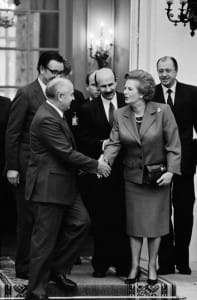
Books: ‘Margaret Thatcher,’ by Charles Moore
 “We can do business”: Margaret Thatcher meets Mikhail Gorbachev, November 1990. CreditPeter Macdiarmid/Getty Images
“We can do business”: Margaret Thatcher meets Mikhail Gorbachev, November 1990. CreditPeter Macdiarmid/Getty Images
In February 1984, during that period when a succession of decrepit Soviet leaders were dropping like flies, the British prime minister, Margaret Thatcher, traveled to Moscow to attend the funeral of Yuri Andropov. There she made an extremely positive impression on her hosts. Not only did she remain outside in frigid temperatures during the entire ceremony, but her personal security man, who shadowed her in his vast overcoat with immense bulging pockets, drew many admiring glances. “Russian security were deeply impressed by this heavily armed man,” one British official recalled. When, however, Thatcher returned to the Kremlin, she removed her own coat and unzipped her fur-lined boots, “whereupon Detective Superintendent Parker produced a pair of high-heeled shoes from his pockets.” A firearm or a stiletto: Both seemed to have potential in the hands of a leader the Soviets had once christened the “Iron Lady.” But the story is indicative of the way the matter of her gender would often surprise and unsettle Thatcher’s contemporaries.
The excellent first volume of Charles Moore’s official life of Britain’s only woman prime minister made the question of Thatcher’s gender the animating force behind the story: how this grocer’s daughter from an unfashionable part of England overcame the prejudice of the times and her party to become Conservative leader, and then battled the skepticism and constant slights that implied that as a woman, not least a lower-middle-class one, she wasn’t up to the job of running the country. By the end of Volume 1, Thatcher had triumphed over those doubters, not least in leading Britain to victory in the Falklands war — a conflict during which, inevitably, some had suggested that a female leader might lack the moral fortitude to direct British forces in wartime.
This new volume opens with Thatcher reaping the political rewards of her success, winning a thumping 144-seat parliamentary majority at the 1983 general election, and covers the four-year period up to another comprehensive victory in 1987 when Thatcher became the first British prime minister since Lord Liverpool in the 1820s to win three successive elections. Those two landslides in 1983 and 1987 tell us something of the challenge facing Moore as biographer. Whereas the first volume was in many ways a bildungsroman — the education of Margaret Thatcher — this latest volume takes us from electoral triumph to electoral triumph, with not much to challenge her between times. It was, in the words of the Wham! pop song that Moore uses for the subtitle of the British edition of this book, a time when Thatcher had “Everything She Wants.”
There were moments of drama, of course — the national coal miners’ strike and a cabinet scandal known as the Westland affair, for example — but during such times, even when she was vulnerable, Thatcher’s ascendancy was such that she was only occasionally stirred, and rarely shaken. In this she was helped by the poor quality of her opponents — the miners’ leader, Arthur Scargill, who took his members out on strike as winter ended and without the mandate of a national ballot, and the verbal circumlocutions of the Labour leader, Neil Kinnock. (“It needed a scalpel,” said Tony Blair, one of Kinnock’s young backbenchers. “All she got from Neil was a rather floppy baseball bat.”) In the end, it was the Provisional I.R.A. that came closest to taking Thatcher down with a bomb attack on her hotel during the 1984 Conservative party conference in Brighton. Had she been in the bathroom rather than the sitting room of her suite when it went off, she almost certainly would have been injured.
For Thatcher, many of the most exacting moments of the period came abroad rather than at home. There was the wooing of Mikhail Gorbachev as the coming man in the Soviet hierarchy, and the presentation of him to the Americans as a man with whom “we can do business.” Surprisingly, Gorbachev was in many ways easier to do business with than President Reagan, the man who claimed her as a conservative soul mate. Thatcher fell out badly with the president over the American invasion of Grenada in 1983, and again in 1986 over what she saw as his naïveté on nuclear weapons at the Reykjavik summit. Her answer to these and other difficulties was relentlessly to pursue her point of view in a way that was uniquely her own. “Almost any other British leader would have let himself be overcome by boredom, embarrassment, good manners or sycophancy towards his powerful hosts,” Moore, in his characteristically laconic style, observes of one such occasion at Camp David in 1984. “But Mrs. Thatcher was impervious to boredom if she thought a point mattered, . . . and she almost never considered repetition a fault.” It was a performance that left the Americans “impressed and exasperated in equal measure.” Reagan admired her greatly, but never let the prime minister get in the way of everything he wanted. Asked why he had humiliated Thatcher by not telling her in advance about the invasion of Grenada, Reagan said simply, “Because I didn’t want her to say no.” It was, Thatcher said afterward, a bitter lesson in “how large powers behave.”
The frustrations of life as a junior partner provide some much needed grit in the oyster of what is otherwise a story of essentially unbroken success. The sense of struggle and triumph over adversity that made the first volume so compelling is inevitably missing here. The ground is already well trodden, so there are fewer surprises. Moore had exclusive access to Thatcher’s private and state papers, but any correctives to fine earlier biographies by the likes of Hugo Young and John Campbell are principally those of nuance rather than revelation.
This is not to underplay Moore’s remarkable achievement. He writes clearly and honestly, never letting his essentially positive view of Thatcher get in the way of his “public interest” duty to present us with the evidence as he finds it. Occasionally his broadly thematic approach means that we miss the drama of living in the moment, such as when in December 1984 Thatcher is balancing the miners’ strike, a visit to China to sign the Hong Kong Agreement and a trip to Camp David to berate President Reagan about the Strategic Defense Initiative (Star Wars). One of Thatcher’s greatest strengths was her ability to master astonishing amounts of detail without losing a sense of strategic vision. That achievement is lessened by the inevitable smoothing-out process of Moore’s thematic analysis, which makes events seem clearer than they actually were in the chaos of the day-to-day.
Such cavils, however, are made possible only because Moore himself has set the bar almost impossibly high. His mastery of the vast range of topics with which Thatcher herself had to grapple is absolute, his marshaling of evidence adroit, and his judgments deliberate and fair. Moore remains on target to produce the definitive “case for the defense” of this titanic and still controversial figure. His work will very likely stand alongside that of John Morley, official biographer of Gladstone, as one of the masterpieces of British political history.
MARGARET THATCHER
The Authorized Biography
At Her Zenith: In London, Washington and Moscow
By Charles Moore
Illustrated. 821 pp. Alfred A. Knopf. $35.

